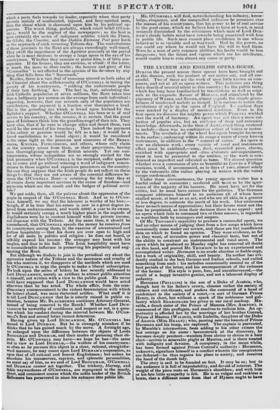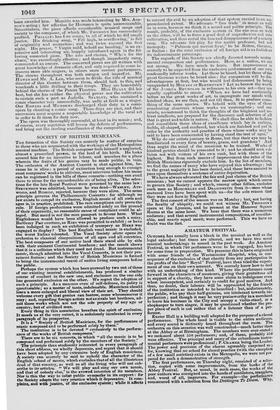TIIE LYCEUM AND ENGLISH OPERA-HOUSE. DURING the present season three
operas have been brought out at this theatre, each the product of our native soil, and all suc- cessful. Two of these are the work of men little known as com- posers, and not at all as opera-writers. This indicates any thing but a dearth of musical talent in this country ; fin the public taste, e had) has long been familiarized by trasslations as well as origi- nals to the exquisite flavour of Moz sir, and stimulated by the piquancy of WEBER and Seoint,almost otgsids the simple grace- fulness of unadol tied melody as insipid. It IS curious to notice Ilse revolutions of style in the opera of Eligland. ealliest days were marked by a display of musical e:udition. Even in his first opera we discover the mighty power which Pour:Esc wielded over the world of harmony. An opera was ilot then a mere col- lection of popular airs, but an evSlence of deep and extensive knowledge. Afterwards, in the time of ,ion:, every thing centered in melody—there was no combination either of voices or instru- ments. The revolution of the wheel has again brought harmony to its surface; embracing within its range a union of every known instrument, in addition to the " consort of voices." An opera is now an elaborate work : every variety of vocal and instrument effect must be exhibited,—song, duet, concerted piece, chorus, enriched with appropriate and often elaborate accompaniment, must in turn be presented to the auditor, or the work is con- demned as imperfect and ridiculed as tame. We almost question whether even a succession of airs so beautiful as Love in a Village contains, would, if accompanied, as in days of yore, almost solely by the violoncello (the violins playing in unison with the voice) escape condemnation.
Under these circumstances, the young operatic writer has a fearful ordeal to encounter ; rendered still more so by the igno- rance of the majority of his hearers. He must have art for the critics, but he must have nature for the galleries. The German composer addresses himself to an audience all of whom have studied music, at least as an art, and who are all able, in a greater or less degree, to estimate the merit of his work. Our audiences have no such means of appreciation; but their favour must not the less be propitiated, as from their decision there is no appeal : and an opera which fails to command two or three encores, is regarded as worthless both by managers and singers.
Of Mr. Teomsoses capability to produce a successful opera, we had no other means of judging than from a few songs which have occasionally come under our review, and these are but insufficient data on which to found an opinion. They were evidence, as far as they went, of inventive power and classical taste, but not of the ability to construct an instrumental and vocal score. The opera which he produced on Monday night has removed all doubt on this head, and proved Mr. THOMSON to be an experienced and accomplished writer. Hermann is no crude abortion or feeble copy, but a work of originality, skill, and beauty. Its author has evi- dently studied in the best German and Italian schools, and culled something from each : his melodies occasionally remind us of the best periods of the latter, and his accompaniment of the richness of the former. His style is pure, free, and unembarrassed,—the result of a happy inventive genius, and not a laboured display of pedantry.
Hermann (PHILLIPS) is the son of a Duke of Austria, who, though heir to his father's crown, chooses rather the society of robbers and cut-throats, and prefers the command of a band of condottieri to the society of a court,—a sort of German Prince Henry, in short, but without a spark of the nobleness and gal- lantry which SHARSPEARE has given to our royal madcap. Ma- ralda, a dumb sister of the Prince of Mantua (Mrs. ASHTON), is enaraoured of this profligate, and resolves to reclaim him. An op- portunity is afforded her by the marriage of her brother Conrad, Prince of Mantua (WILSON), with Isabella, daughter of the Duke of Austria (Miss HEALY); who, passing near the haunts of Prince Hermann and his troop, are captured. The captain is prevented, by Maraldas interposition, foam adding to his other crimes the last outrage on his sister : horrorstruck at the discovery, he becomes deeply penitent—wanders from shrine to shrine in a hair
shirt—arrives in miserable plight at Mantua, and is there treated with indignity and derision. A conspiracy, in the mean while,
has been formed against Prince Conrad's authority : Hermann, unknown, signalizes himself in a conflict wherein the conspirators are defeated—he thus regains his place in society, and receives the hand of the dumb lady. The story is said to be founded on fact. It may be so; but to the audience it is full of improbability, and devoid of interest. The
weight of the piece rests on Hermann's shoulders; and with him or his fate little sympathy is felt. He is so vulgar and reckless a brute, that a different noose from that of Hymen ought to have been awarded him. Maralila was made interesting by Mrs. ASH- TON'S acting ; her affection for Hermann is quite unaccountable. Nevertheless, the piece affords considerable musical scope and variety to the composer, of which Mr. THOMSON has successfully profited. PHILLIPS has fur songs, to all of which he did simple justice. His drinking song, " Fill high, to overflowing," is full of originality and animation ; and was twice encored the first night. His prayer, " Virgin mild, behold me bending," is an ex- pressive and interesting air, happily introduced again in the fol- lowing concerted piece. The solo and chorus, " Whe's for the chace," was exceedingly effective; and though imperfectly sung, commanded an encore. The concerted pieces are all written with great knowledge of dramatic effect, and only required in some in- stances More able singers, in others more correct performance. The chorus throughout was both meagre and imperfect. Mr. Hewes and Mr. A. LEE, who seem to divide the title of musical director of this theatre between them, should look to this, and vouchsafe a little drilling to their troops. They are lamentably behind the chorus of the Patent Theatres. Miss HEALY did her best, but she has neither the physical power nor the cultivation to sustain such a part as isubella. STANLEY, who sustained a comic character very successfully, was sadly at fault as a singer. Our EDWI NS and MUNDENS discharged their duty in a comic opera by chanting a comic song. Those days are past, and their successors must acquire a respectable knowledge of the vocal art in order to fit them for duty now.
The opera was thoroughly successful, at least in its music ; and, of course, every repetition will lessen the defects of performance, and bring out the sterling excellencies of the composition.



























 Previous page
Previous page